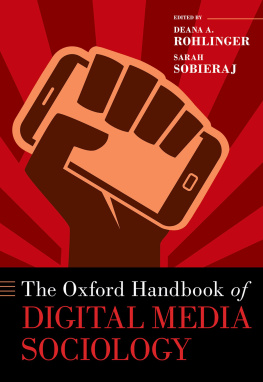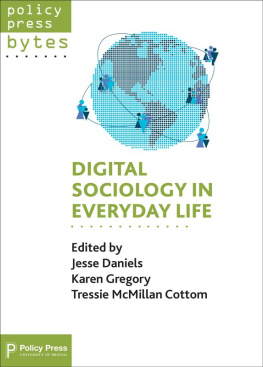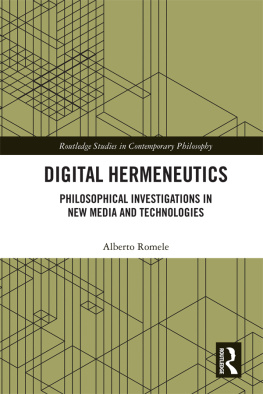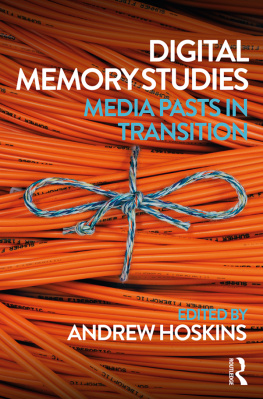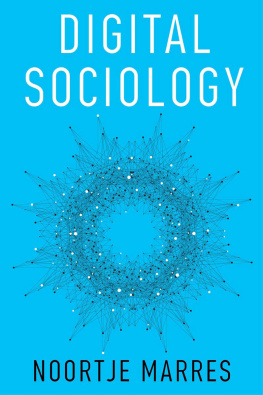The Oxford Handbook of
Digital Media Sociology

Oxford University Press is a department of the University of Oxford. It furthers the Universitys objective of excellence in research, scholarship, and education by publishing worldwide. Oxford is a registered trade mark of Oxford University Press in the UK and certain other countries.
Published in the United States of America by Oxford University Press
198 Madison Avenue, New York, NY 10016, United States of America.
Oxford University Press 2022
All rights reserved. No part of this publication may be reproduced, stored in a retrieval system, or transmitted, in any form or by any means, without the prior permission in writing of Oxford University Press, or as expressly permitted by law, by license, or under terms agreed with the appropriate reproduction rights organization. Inquiries concerning reproduction outside the scope of the above should be sent to the Rights Department, Oxford University Press, at the address above.
You must not circulate this work in any other form and you must impose this same condition on any acquirer.
Library of Congress Control Number: 2022012633
ISBN 9780197510636
eISBN 9780197510650
DOI: 10.1093/oxfordhb/9780197510636.001.0001
Contents
Deana A. Rohlinger and Sarah Sobieraj
Judy Wajcman
Nick Couldry and Andreas Hepp
Jenny L. Davis
Zizi Papacharissi
Stefania Milan and Emiliano Trer
Cassidy Puckett and Matthew H. Rafalow
Stephen R. Barnard
Raelene Wilding
Stef Aupers and Lars de Wildt
Jamie Woodcock
Deborah Lupton
Murray Goulden
Shantel Gabrieal Buggs
Jennifer A. Johnson
Alexander Seifert and Shelia R. Cotten
Elizabeth Wissinger
Brady Robards, Paul Byron, and Sab DSouza
Xiaoli Tian and Qian Li
Daniel Muriel
Thomas V. Maher
Jessica L. Beyer
Jeffrey Lane and Will Marler
Sophie Bishop and Brooke Erin Duffy
David N. Pellow
Olga Boichak
Stephanie M. Ortiz
Matas Dodel
Jen Schradie and Liam Bekirsky
Gabrielle Lim and Joan Donovan
Sarah Sobieraj
Alice Mattoni
Jennifer Earl, Sam Scovill, and Elliot Ramo
Deana A. Rohlinger
Deana A. Rohlinger is a professor of sociology at Florida State University with expertise in political participation, political change, and digital technologies. She is author of Abortion Politics, Mass Media, and Social Movements in America (Cambridge University Press, 2015) and New Media and Society (New York University Press, 2019) as well as dozens of research articles and book chapters that analyze topics as diverse as the kinds of claims individuals make in the emails they sent Jeb Bush about the Terri Schiavo case to collective identity processes in MoveOn.org and the Tea Party movement. Her most recent articles can be found in Information, Communication & Society, Signs, Mobilization, New Media & Society, and Social Media + Society. Rohlinger has co-edited three volumes, Strategy in Action: Movements and Social Change (University of Minnesota Press, 2012), Research in Social Movements, Conflicts and Change: Media, Movements, and Political Change (2012), and Emerald Studies in Media and Communication: Social Movements and Mass Media (2017); guest-edited issues of two journals (Information, Communication & Society in 2018 and the American Behavioral Scientist in 2009); served as the book review editor for the journal Mobilization (20122018); and was the editor of the section on social movements for Sociology Compass (20122015). Rohlinger chaired the American Sociological Associations Communication, Information Technologies and Media Sociology section (20182019) and is chair-elect for the Collective Behavior, Social Movements section. She has been interviewed on a range of topics including digital politics and controversies involving Planned Parenthood as well as written commentaries for a variety of media outlets including U.S. News & World Report, Fortune, The American Prospect, and The Conversation. Her body of research was recently honored with the 2021 William F. Ogburn Mid-Career Achievement Award from the Communications and Information Technologies and Media Sociology section of the American Sociological Association.
Sarah Sobieraj is a professor and chair of The Department of Sociology at Tufts University and a faculty associate with the Berkman Klein Center for Internet & Society at Harvard University. Her most recent book, Credible Threat: Attacks Against Women Online and the Future of Democracy (Oxford University Press, 2020), examines the impact of identity-based digital abuse on womens participation in social and political discourse. She is also the author of The Outrage Industry: Political Opinion Media and the New Incivility (Oxford University Press, 2014) with Jeff Berry and Soundbitten: The Perils of Media-Centered Political Activism (New York University Press, 2011). Sobieraj also edited (with Rob Boatright, Danna Young, and Tim Schaffer) A Crisis of Civility: Political Discourse and Its Discontents (Routledge, 2019). Her most recent journal articles can be found in Information, Communication & Society, Social Problems, PS: Political Science & Politics, Poetics, Political Communication, and Sociological Theory. Her work has been featured in venues such as The New York Times, The Washington Post, The Boston Globe, Politico, Vox, CNN, PBS, NPR, The American Prospect, National Review, The Atlantic, Pacific Standard, and Salon. Sobieraj serves on the advisory board of the Social Science Research Councils Disinformation Research Mapping Initiative and is a member of the National Institute for Civil Discourse Research Network.
Stef Aupers is a professor of media culture in the Department of Communication Sciences, Institute for Media Studies at KU Leuven. His research deals with the transformation and mediatization of Western culture, and he has published widely in international journals on topics such as digital religion, artificial intelligence in everyday life, online game culture, and conspiracy theories on the internet. His most recent book, edited with Dick Houtman and Rudi Laermans (KU Leuven) is Science under Siege: Contesting the Secular Religion of Scientism (Palgrave, 2021).
Stephen R. Barnard is an associate professor and chair of the Department of Sociology and Criminology at Butler University. His work focuses on the roles media and communication technologies play in relations of power, practice, and democracy. He is the author of Citizens at the Gates: Twitter, Networked Publics, and the Transformation of American Journalism and co-author of All Media Are Social: Sociological Perspectives on Mass Media. His scholarship has been published in New Media & Society, Journalism, Cultural Studies Critical Methodologies, Hybrid Pedagogy, and several edited volumes.
Liam Bekirsky is a doctoral student at the Oxford Internet Institute. His research interests are at the intersection of sociology and social network analysis, education, and knowledge building. Prior to joining the Oxford Internet Institute, Bekirsky completed a dual masters degree at Sciences Po Paris in digital and new technology and public policy and in global affairs at the University of Toronto. He is also trained and certified as a secondary school teacher. Outside of academia, he has worked in education policy at the Organisation for Economic Co-operation and Developments Centre for Educational Research and Innovation and at the Council of Ministers of Education, Canada.

